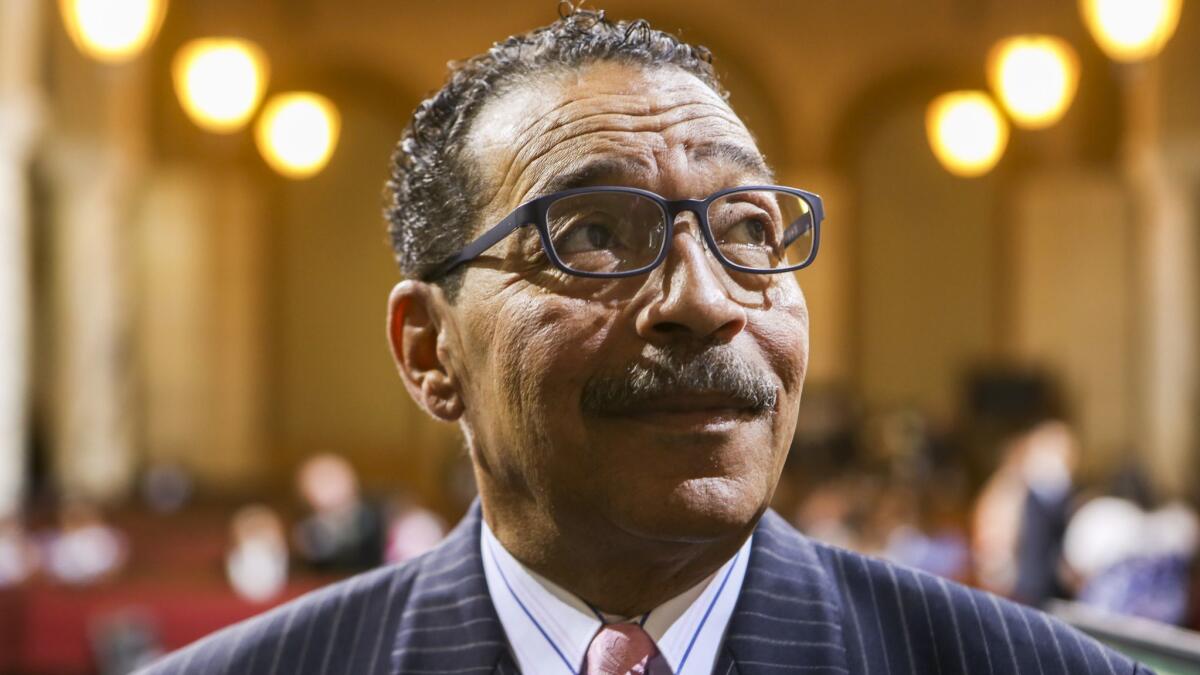Editorial: LAPD’s discipline process demands a true public airing, not a hollow road show

- Share via
In May 2017, Los Angeles City Council President Herb Wesson promised a series of hearings in neighborhoods across the city to discuss policing issues, including the way the officers are disciplined . It was an excellent idea. A series of high-profile officer shootings and other uses of force against unarmed African American men had added a sense of urgency to the nationwide debate over policing. Los Angeles voters had just approved a sweeping change to the LAPD discipline process. There was, and there remains, some concern over how that change is to be implemented, and whether it ultimately will enhance or undermine police accountability. The time was ripe for some meaningful public discussion and input.
But in the year and a half since that vote and that promise, the committee Wesson set up for the purpose has met only three times, only at City Hall, and has discussed little of substance. That didn’t stop the panel from moving forward last week with a set of marching orders on the very topics that were supposed to be publicly aired but were not, such as whether retired police officers should be allowed to serve among the civilians who hear officers’ disciplinary appeals.
Nothing is in stone until the full City Council acts. Yet there is reason for concern that the promised series of hearings may turn into a kind of “road show” that is meant simply to sell decisions that already have been made, rather than to allow public testimony to assist in shaping the officer discipline system.
Public health and safety require confidence in police integrity, and that means a discipline system that the public and officers alike can trust.
That would be a shame. Public health and safety require confidence in police integrity, and that means a discipline system that the public and officers alike can trust. There are many ways to go wrong.
Consider, for example, what recently happened in Chicago.
A week after a jury returned guilty verdicts against a police officer for the 2014 fatal shooting of 17-year-old Laquan McDonald, a panel returned to duty another officer who, in 2012, fatally shot another African American teenager, in the back of the head. The officer had been suspended for a year following a ruling by the Independent Police Review Authority. He was cleared by the Chicago Police Board.
Whether it was the right or the wrong decision is not the point, but rather that the lack of public confidence in the Chicago police has been exacerbated by a confusing and changing system of officer discipline. The much-criticized accountability office has since been reconstituted and renamed, but the two remaining civilian panels have not earned the confidence of Chicagoans. A proposed consent decree for the overhaul of the Chicago Police Department is currently in the hands of a federal judge. With luck, it can provide the institutional integrity, and as a result the public confidence, that is currently lacking.
Los Angeles has been through similar crises of confidence and has emerged with a discipline system that is generally well regarded but still could stand some well-considered tweaks.
The LAPD chief disciplines officers for serious misconduct. Officers may appeal to a three-member Board of Rights, which can sustain or overturn the chief’s decision or reduce the ordered punishment. After the Rodney King beating, voters altered the composition of the appeals boards by including a civilian alongside two command-level police staff. Voters last year changed that again, allowing officers to choose to have their cases reviewed by all-civilian appeals boards.
Enter the Fray: First takes on the news of the minute from L.A. Times Opinion »
But nearly 18 months later, the City Council has yet to implement that charter change because it has not yet made decisions on seemingly mundane, yet highly important, questions.
Like that question about whether retired officers ought to be able to serve as the civilian members of the Board of Rights. That’s an emotional touchstone for many police reform activists, who generally object to retired officers serving in oversight positions reserved for civilians.
Experience has shown that civilians are more lenient in L.A. police discipline matters than are active officers (a fact that led the police union to seek last year’s ballot measure allowing them to choose all-civilian boards).
Would retired officers on discipline appeals boards act more like active command officers, or more like civilians? And does it matter? The questions — and many others like it — require study and public input before they are answered. The hearings, obviously, should come before the recommendations.
Follow the Opinion section on Twitter @latimesopinion and Facebook
More to Read
A cure for the common opinion
Get thought-provoking perspectives with our weekly newsletter.
You may occasionally receive promotional content from the Los Angeles Times.










